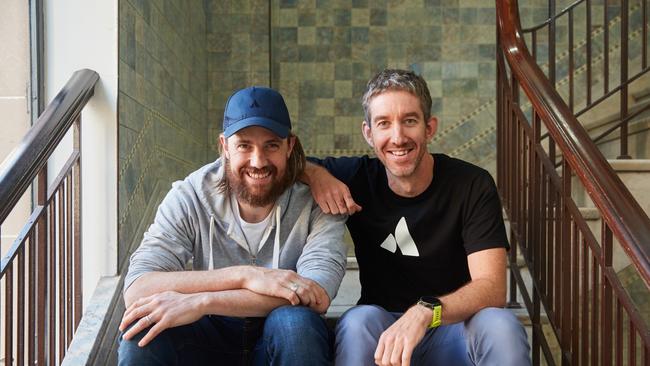How the Atlassian founders will collect $1.7bn in the next year, to spend on energy, property and technology investments
A series of share sales could see Mike Cannon-Brookes and Scott Farquhar even more cashed up, giving the local billionaires deeper pockets for their spending sprees.

There’s about $1.7bn reasons why Mike Cannon-Brookes and Scott Farquhar are likely to step up their interventionist spending on energy assets.
Not to mention their outlay on islands, up-market property and other investments such as technology start-ups and listed company stocks.
As co-founders of Atlassian, Cannon-Brookes and Farquhar have the bulk of their estimated current wealth of about $24bn each tied up in their Nasdaq-listed software firm.
But the duo steadily sell down a relatively small, yet lucrative, portion of their stock holdings annually under what are known as 10b5-1 Trading Plans under US guidelines.
The latest plan, which came into effect in July, will see Cannon-Brookes and Farquhar each sell about 2.16m of Atlassian shares over the next 12 months.
At current share prices, with Atlassian trading at about $US279.35 on Tuesday Australian-time, the duo could each make about $870m, or $1.7bn combined, from selling down some Atlassian stock in stages over the next 12 months.
That amount could be even higher depending on Atlassian’s share price movement. The consensus 12-month price target for 21 analysts covering the stock is $US329.57 according to Bloomberg.
The prearranged trading plans were adopted to allow Cannon-Brookes and Farquhar to sell some of their Atlassian shares “over time as part of their long-term strategies for individual asset diversification and liquidity,” a recent Atlassian announcement detailed.
Cannon-Brookes and Farquhar now hold about 43 per cent of Atlassian shares, a number that would be reduced to about 41.35 per cent by the end of June next year.
Atlassian shares are down about 20 per cent since January 1 amid the wider sell-off of technology stocks, though have risen 36 per cent in the past week after the Cannon-Brookes and Farquhar unveiled better than expected financial results
The pair have already combined to sell about 30 million shares under previous annual 10b5-1 Trading Plans over the past six years, a time in which Atlassian’s share price has risen from $US30 at the beginning of 2016 to a peak of $US458.13 last October when Cannon-Brookes and Farquhar’s estimated wealth hit $30bn each.
The money from those share sales have given the two tech billionaires plenty of funds to pursue their energy dreams, and plenty of other investments.
Cannon-Brookes has been voluble about green energy and launched a bid for AGL with Brookfield in February. He also has spent about $300 million on Sydney property, holdings in the NSW Southern Highlands and other real estate assets in recent years.
He is AGL’s largest shareholder, accounting for a 11 per cent stake now worth about $600m. AGL shares are up about 38 per cent this year, though have tracked sideways since Cannon-Brookes topped up his stake in May, after which he was successful in his strategy to convince the AGL board to ditch its plan to split into separate generator and retailer arms.
Cannon-Brookes also has shares in payments technology firm Tyro Payments, which has fallen about 62 per cent this year, and home-meals kit group Marley Spoon, which is down about the same amount.
Other holdings include Redbubble, a design marketplace provider that is down about 65 per cent on the ASX this year.
Late last year Cannon-Brookes emerged as a new co-owner of NRL club South Sydney alongside James Packer and actor Russell Crowe, and is already a minority shareholder in National Basketball Association (NBA) club Utah Jazz in the US.
Meanwhile, Farquhar’s investment fund Skip Capital, headed up by the his wife Kim Jackson, made a $300m offer with private equity partner Stonepeak Partners for Queensland renewable energy developer Genex Power.
The offer, rejected by the Genex board on valuation grounds, came after the consortium had built a 19.9 per cent stake in Genex in July.
Farquhar has property investments in and around Sydney, and also has tens of millions invested in various start-ups and technology companies via Skip Capital.
He has also mentored start-up success stories such as SafetyCulture and CultureAmp, which have both become $1 billion “unicorns”, though valuations of privately-held start-ups have fallen in 2022.
Skip has continued to make investments this year though, joining funding rounds for Sydney cloud computing firm Strong Compute, critical infrastructure digital start-up Neara and health tech start-up Human in recent months.







